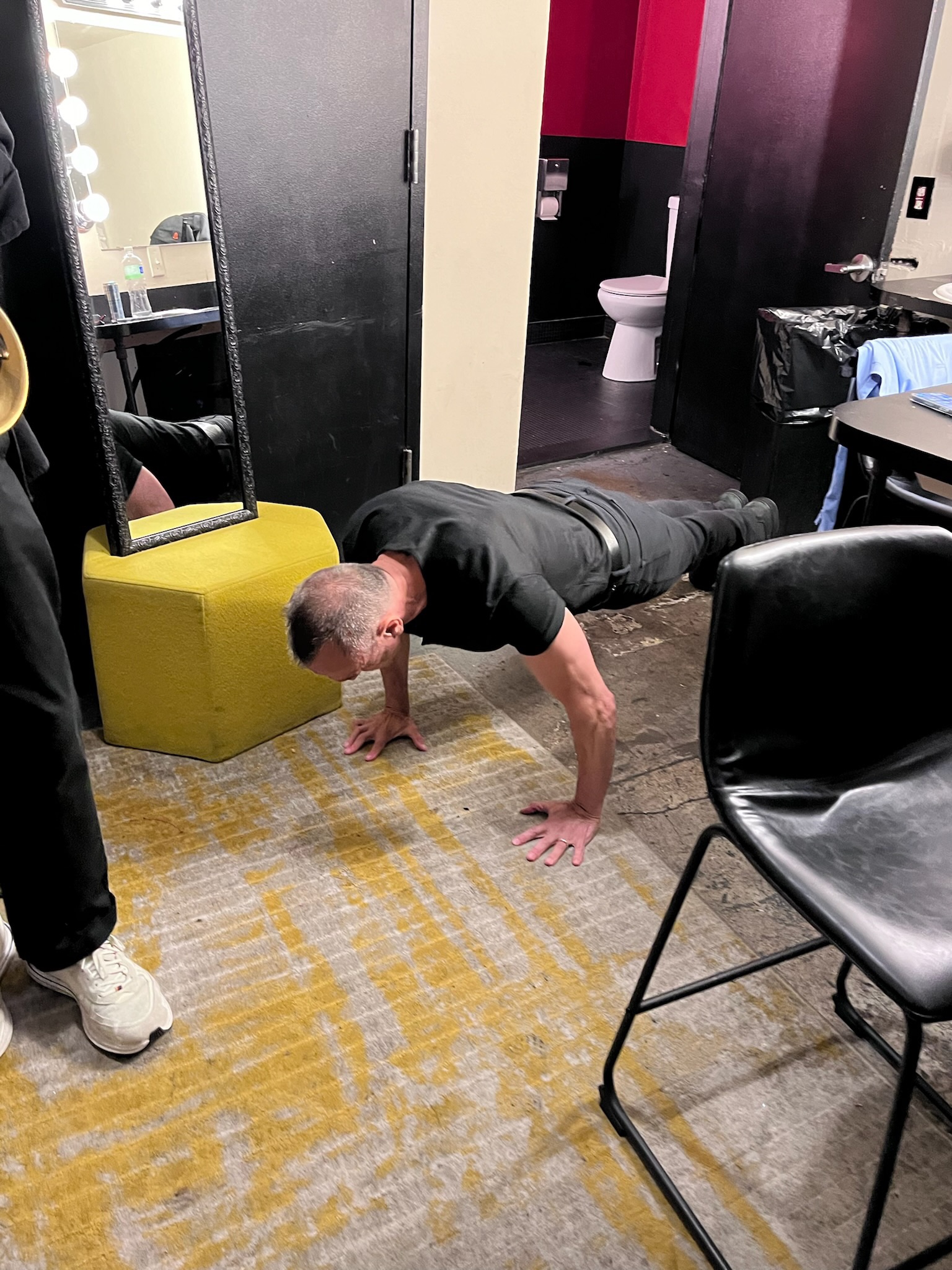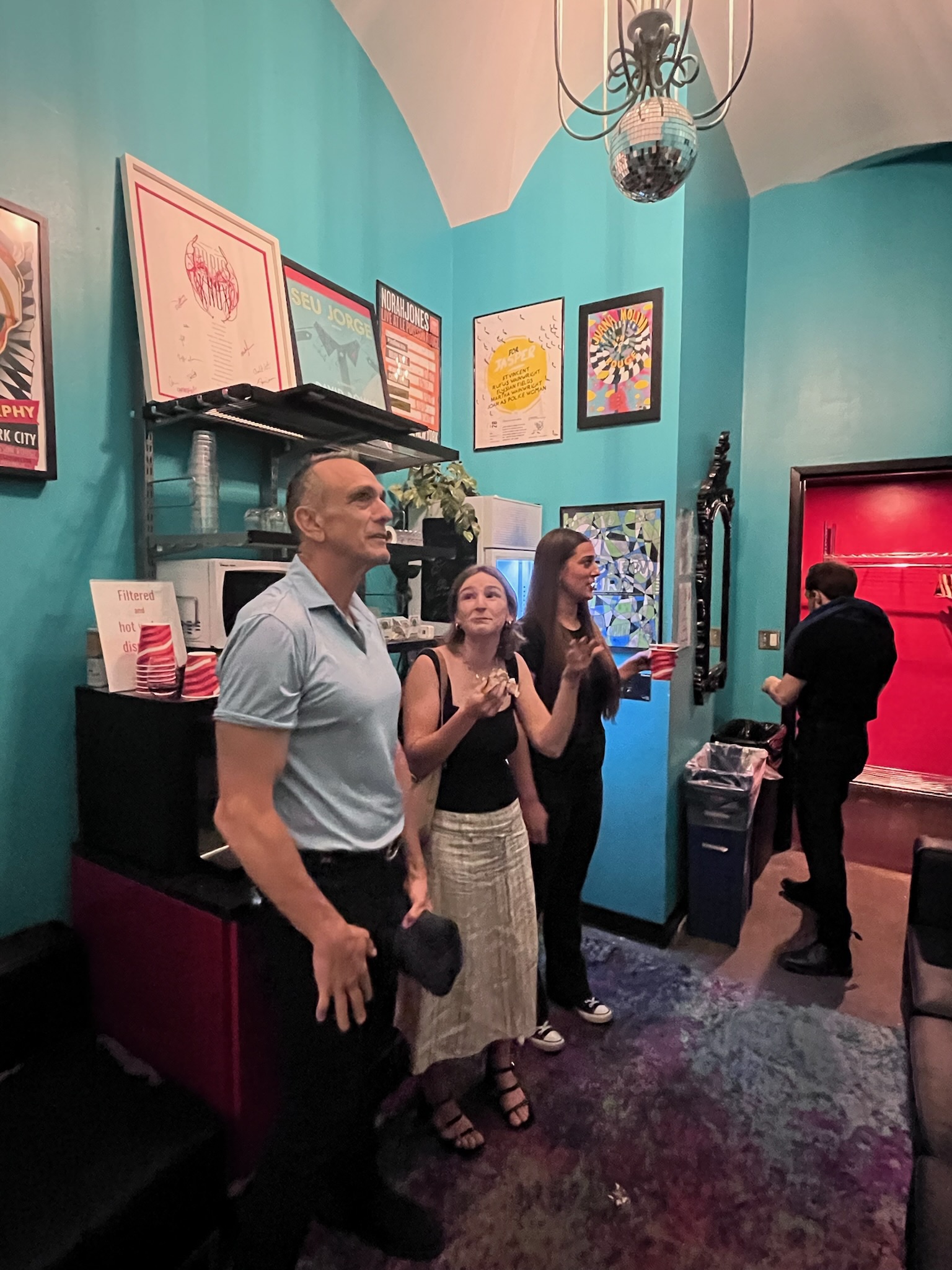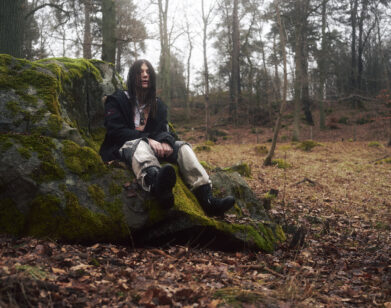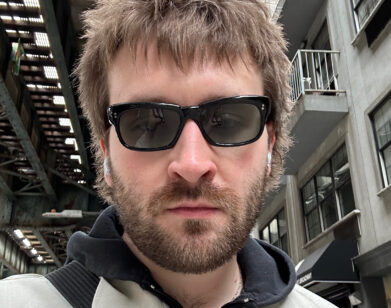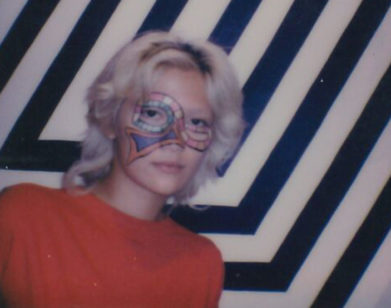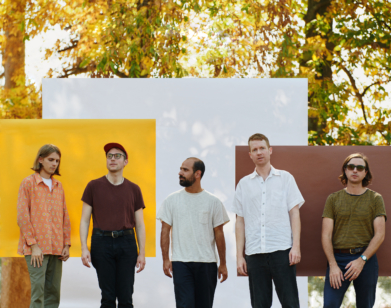TOUR DIARY
Hank Azaria’s Next Act? Becoming Bruce Springsteen.
When turning 60, people typically decide to take up a relaxing hobby like gardening or riding a motorcycle. Not many choose to start a Bruce Springsteen tribute band and prepare to tour it around the country. But that is exactly what Hank Azaria has done, and while celebrating his 60th birthday party, he introduced the world to “Hank Azaria and the EZ Band.”
The New Yorker is best known for his voice-acting on The Simpsons, bringing to life iconic characters like Moe Szyslak, Chief Wiggum, and Comic Book Guy. This wealth of experience has prepared him for one of his biggest challenges yet, performing in character as The Boss during a live concert. A lifelong fan, Azaria explained how Springsteen’s songs have carried him through “dark times as a teenager,” making this latest venture a particularly elaborate form of “hero worship.”Following his live show at Le Poisson Rouge in New York, he took the time to speak to me about how Springsteen’s music has shaped his life and share some of the difficulties of becoming The Boss.
———
ADAM DAVIDSON: How has your day been so far?
HANK AZARIA: It’s been fine! I had been away for the weekend, I had my show on Thursday and then went away so it’s like a reentering society at the moment. How are you doing?
DAVIDSON: I’m good. I’m just in London at the moment. I saw you went viral over the last couple of weeks for your London videos with the Horse Guard.
HANK AZARIA: Yeah. I should post from London more often.
DAVIDSON: You mentioned the concert. How did that go?
AZARIA: It started as just a way to cheer myself up around turning 60 and have some fun at my birthday party. I’m such a huge Springsteen fan. I know what it’s like to attend those concerts and have those communal experiences people have with the band that they love the most. But there’s a very specific flavor of it for Springsteen fans that I really felt I could help folks share in. And it was really, really fun. A nightclub full of people singing along to every single word, and that’s what I imagined.
DAVIDSON: Did you have stage fright?
AZARIA: The first night I did it on my birthday, and it went beyond stage fright. I had a full-blown panic attack a few hours before, and actually, I threw up from nerves, which I’ve never done before in my life. I was a wreck because I was also surprising people. I didn’t really tell anyone I was going to do it. I did a reverse surprise party. I was nervous the other night, but more like how you get nervous before any performance, a manageable channeling of nervous energy. But it is theatrical. I tell a lot of stories and I relay a lot of personal details about what the songs mean to me. I weave in a lot of storytelling in the course of the evening.
DAVIDSON: Does that make it feel more natural then, because it’s theatrical and you’re staying in character, even if you’re telling your own stories?
AZARIA: It is easier. I imitate the way Bruce talks, his rasp, and I stay in character as I tell stories about myself, but I’m speaking as Bruce. I wondered for a long time, “Will that work?” And I found that it did. Also, I knew that at my birthday, half the audience would know all the songs and half the audience would have no idea. And I wanted to tee up each song with context either for what it means to me or why Bruce wrote it. It’s almost like when you watch the Olympics and you get those up close and personal stories about the athletes, so you get more invested in the event.
DAVIDSON: Yeah, I went to see Springsteen at Hyde Park last summer. Even the songs that I didn’t know, he set them up and created this emotional attachment. He’s such a great storyteller.
AZARIA: Yeah, he does that so amazingly well, but he’ll do 30 songs a night, so he can’t do that with every song. But I’ve seen probably 25 or 30 Bruce shows in my life and I kind of wish he would.
DAVIDSON: You mentioned the raspiness in his voice. How are you feeling in the morning after doing that?
AZARIA: It doesn’t hurt, but I get a little raspy, but I really am used to that. I mean, if I do a Simpson show where there’s a lot of Moe, the Bartender yelling, it has the same effect. Doing Duffman will blow me out for a week if there’s a lot of him in the show. I have to space out the singing rehearsals of Bruce. I can only do it about every five days. But as a character actor sings on The Simpsons, you’re not expected to sound all that great, as long as you can carry the tune and deliver the emotion. For this show, I had to really get the vocal impression of Bruce into song. I’ve had to learn a lot more about singing than I ever had paid attention to before, but I’m getting more stamina as I go.
DAVIDSON: What was it about Bruce Springsteen specifically that made you want to pursue this?
AZARIA: He was my ultimate hero as a kid and a teenager, to put it succinctly. And I had a lot of them. I loved Al Pacino and George Carlin and Robert De Niro and Peter Sellers and Monty Python, and I love the Beatles and I love the Stones. I’d say Springsteen was at the top of that list. I talk about this in the show, but a lot of my vocal impressions as a teenager came out of hero worship, and I heard Bruce talk enough on those bootleg albums delivering those monologues that I picked up a Bruce impression. His music meant so much to me. It really did get me through some dark times, especially as a teenager. I got to tell Bruce when I met him one time, that it was really his monologues during his concerts that encouraged me to try to be a creative person when really nobody else was. He’s got that gift that great artists have where you feel like he’s singing personally to you and understands your pain. I clung onto his music for dear life at times.
DAVIDSON: Did the show transport you back to those early moments?
AZARIA: I mean, past the age of 40, nostalgia takes on a different meaning. It becomes this acute, aching, longing, bittersweet feeling that you have for the past, and hearing a song from when you were a teenager is one of the quickest ways to transport yourself almost back in time. And all the songs we do in the set certainly go in that category, especially “Thunder Road,” “Growin’ Up,” and “She’s The One.”
DAVIDSON: Do you remember your first ever Bruce gig? You said you’ve seen Bruce 20-plus times.
AZARIA: It was in Madison Square Garden. It was The River Tour, so that’s probably 1978 to 1980. He played almost that whole album of The River. I was pretty awestruck that night. It was a big build-up. I probably was 17 years old and I had been truly worshiping Bruce in the way that only a teenage boy can for about five years, at that point. I think he played for four hours that night.
DAVIDSON: Wow.
AZARIA: Those legendary concerts that he did at that time. He’ll do about two-and-a-half hours now, but it was like a five-act play or something. It was wild.
DAVIDSON: How many times have you met Bruce?
AZARIA: I met him twice and I kind of made a fool out of myself both times. I’m not going into the whole story, but suffice to say, I fanboyed out so hard. My friend calls it Bruce Juice, this feeling that overtakes people upon seeing their idol. It’s a fugue state, almost. My voice went up about seven octaves and I spoke about 900 miles an hour, and the second time, I knew better than to do that and I still couldn’t help myself.
DAVIDSON: I heard you turned down two projects because you wanted to go through with this one. Do you get those strong creative impulses quite often?
AZARIA: This is rare. I mean, just to disclaim a little, if the projects were really great, I probably would’ve done them. We’re raising money for charity which is really important to me, for my foundation, and the few places that we mainly give to. The primary focuses are education, social justice, and recovery. And I can’t think of a more fun thing to do than blow it out on connecting with Bruce fans and raising money for charity. But I’ve had passion projects like that, like when I did my show Brockmire. I produced that as well, and it was an idea I’d had from when I was a teenager. It took me 10 years to make it. And obviously The Simpsons, I mean, I feel like I was born to do that. I’m the luckiest person in the world that that’s my job and it’s lasted for this long. Spamalot was another one, and this is definitely one of them.
DAVIDSON: It must be so rewarding, now that you’ve built yourself up in your career, to continue your legacy through social justice.
AZARIA: It really is. I’m really fortunate to have a day job that has lasted this long and puts me in a position where I can choose what I want to do. And over time it’s become more and more important to me to give back. This band project really did just start as a way to have fun at my birthday, and it turned out so well that it felt like it would be a shame not to keep doing it. It didn’t occur to me until about a month before my party to say, “No presents, but please donate to my foundation.” We raised a bunch of money and just put two and two together and said, “Wait a minute, we can do a tour and give all the proceeds to the foundation.”
DAVIDSON: I heard they tried to get Bruce on The Simpsons multiple times, and I think one of the producers said he just likes to play music and hang out with his kids. Do you think that’s why his legacy is so great?
AZARIA: Well, yes, but I remember memorizing his monologues as a kid as much as the songs. He’s a pretty intense poet. For someone whose main metaphor was basically cars, he wasn’t much of a car person. It was just all a poetic metaphor. “Streets of Fire” seems like it’s about a car, but it’s not, it’s about what lying and being lied to can do to you. Later in life, you go, “I think I know what he was singing about here.” I talk about this song “Darkness on the Edge of Town,” and I’m a sober person who’s been in recovery. We have a lot of slogans in recovery rooms about how you can’t face your problems alone. Things like, “My mind is a dangerous neighborhood. I never go in there alone,” or, “You’re only as sick as your secrets.” And I know that Bruce understands that kind of pain. To me, the whole album of Darkness on the Edge of Town is about it. But the song ends with this tremendous crescendo of, “Tonight, I’ll be on that hill because I can’t stop. I’ll be on that hill with everything I’ve got.” You think of the expression, “What hill do you want to die on?” And that stubborn self-reliance in the face of adversity, whether it’s addiction or depression or divorce. I grew into really understanding what he was writing about.
DAVIDSON: It’s almost like he can help you better understand your own mind.
AZARIA: It’s almost like parsing a poem. Another thing I found was trying to imitate some of the sounds that he makes was almost like scream therapy. I started to unlock real emotion.
DAVIDSON: What was the research process like?
AZARIA: I’m a natural mimic, and I’ve been making an unconscious or conscious study of him my whole life. So more than half of it just lived in my muscle memory. And then I used live recordings more than the album itself. I mean, I’m pretty intimately familiar with both. I’m that fan who can tell you about seven different recordings of “Glory Days.” But much of it was technical, like, “How can I unlock that register in my voice?”
DAVIDSON: It gives you a new appreciation of his vocal work when you try to do it.
AZARIA: Oh my god, yes. He’s not always as raspy as I sound. Toward the end of the tour he’s a little more ragged, but his range within how he sings is quite impressive, and his stamina. I went to see him in Albany a week before my birthday party, and he sang seven songs in a row with no break. He didn’t even take a breath. He just counted one song right into another. That’s a solid half-hour of singing with no break. That’s intense for anyone, but at age 70, I have real appreciation for that. I know if I do three in a row, I’m sweating and panting because of it.
DAVIDSON: In his performance of “The River,” which is one of my favorite Springsteen songs on the tour, I think he goes operatic. Where did that come from? I didn’t realize he could do that.
AZARIA: Yeah, he does that at the end of “Jungleland.” There’s a recording at the end of “I’m On Fire” where he really starts wailing. One of my dreams is to do this long enough and hopefully well enough that maybe Bruce jumps up with us somewhere for a song or two. That would be a dream come true.
DAVIDSON: If you could choose one song to sing with him, what would it be?
AZARIA: I would sing “Happy Birthday” with him, but if I really had to pick, I’d probably want to sing “Thunder Road.” It’s probably my favorite Bruce song. I have many, but that has stood the test of time, and there’s something about him singing that song that is just so comforting.
DAVIDSON: I think I’ve read that The Simpsons attempted to get Springsteen six or seven times for “Radio Bart” and “Homerpalooza.”
AZARIA: I think it was more like two or three times. One time we actually ended up with Larry King. I don’t know how he replaced Bruce. And then another time I think Sting did the show instead of Bruce.
DAVIDSON: Were you involved in any of those decisions?
AZARIA: No, I’m just a gun for hire, as Bruce would say. But I certainly knew after the fact and I got all retroactively bummed that he didn’t join us.
DAVIDSON: Do you get most starstruck with musician guest stars for The Simpsons?
AZARIA: 100 percent, I really go into a deep trance. I always loved David Byrne and the Talking Heads, but when he walked in, I was absolutely awestruck. Sometimes you don’t know how you’re really going to be affected until you see the person. Tom Petty and Elvis Costello and Nick and Keith, I will never, ever forget every little moment of meeting them. These guys seem like absolute gods to me.
DAVIDSON: Is this your first tour experience as a musician? How has it been?
AZARIA: It changes literally every day. Just two seconds before I spoke to you, we got this wonderful offer to play our first festival in Maryland. I would really like to put this show in theaters because we were at this wonderful rock club, Le Poisson Rouge on Bleecker Street, that has standing room for 800 people, but us Bruce fans, we tend to be getting on in years a little bit and it’d be nice to have people be able to sit in the theater. And I have a couple of ideas about how to make the show even more theatrical and audience-participatory that I’d like to explore. I’d love to put it on in a 2,500-seat theater.
DAVIDSON: I can’t wait to see it. Hopefully, you can bring it to London.
AZARIA: We definitely will. There’s a lot of Bruce fans in London. I love London.
DAVIDSON: I grew up watching The Simpsons. It’s been kind of surreal to speak with you.
AZARIA: Well, Moe says hi. Police Chief Wiggum says hello. Comic Book Guy does not say hello. He doesn’t do that.

